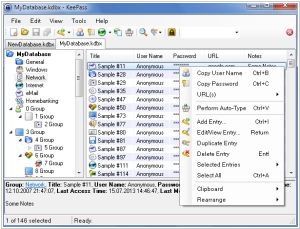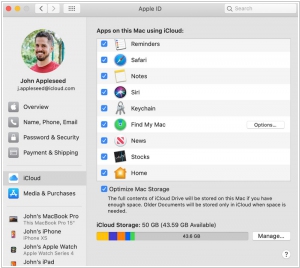KeePass vs iCloud Keychain
August 06, 2023 | Author: Michael Stromann
21

KeePass is a free open source password manager, which helps you to manage your passwords in a secure way. You can put all your passwords in one database, which is locked with one master key or a key file. So you only have to remember one single master password or select the key file to unlock the whole database. The databases are encrypted using the best and most secure encryption algorithms currently known (AES and Twofish). For more information, see the features page.
See also:
Top 10 Password Managers
Top 10 Password Managers
KeePass and iCloud Keychain are two different password management solutions with distinct features and functionalities. Here are the key differences between them:
1. Platform and Integration:
- KeePass: KeePass is a cross-platform, open-source password manager available for Windows, macOS, Linux, and other platforms. It is not tied to a specific operating system or ecosystem.
- iCloud Keychain: iCloud Keychain is an Apple-specific password manager integrated into the Apple ecosystem. It is available on macOS, iOS, and other Apple devices, allowing seamless synchronization between them.
2. Accessibility:
- KeePass: Since KeePass is not tied to any specific platform, it offers flexibility in terms of accessing your password database. You can store the KeePass database file locally, in cloud storage services, or on a portable device.
- iCloud Keychain: iCloud Keychain is tightly integrated with Apple's ecosystem, meaning it primarily works within the Apple ecosystem. It syncs passwords across devices using iCloud, providing easy access to passwords on Apple devices.
3. Syncing and Cloud Storage:
- KeePass: KeePass allows you to choose where and how to sync your password database. You can use various cloud storage services like Dropbox, Google Drive, or OneDrive to sync your KeePass database across devices. It provides manual control over syncing options.
- iCloud Keychain: iCloud Keychain syncs your passwords automatically across Apple devices using iCloud. It leverages Apple's cloud infrastructure for seamless synchronization.
4. Features and Extensions:
- KeePass: KeePass offers a wide range of features and extensions. It supports customizable password generation, secure notes, file attachments, plugins, and supports various encryption algorithms. Additionally, KeePass has a large community contributing to its development, resulting in a diverse set of plugins and extensions.
- iCloud Keychain: iCloud Keychain focuses primarily on password storage and autofill functionality within the Apple ecosystem. It offers features like password generation, password suggestions, and autofill capabilities in Safari.
5. Security:
- KeePass: KeePass is known for its strong emphasis on security. It uses strong encryption algorithms (e.g., AES) to protect the password database. The master password required to access the database is not stored anywhere, providing an additional layer of security. KeePass allows you to enhance security through key file authentication and two-factor authentication (via plugins).
- iCloud Keychain: iCloud Keychain is designed with security in mind and uses encryption to protect your passwords. It leverages Apple's security infrastructure, including iCloud security measures, device passcodes, and biometric authentication (such as Touch ID or Face ID) to secure access to passwords.
See also: Top 10 Password Managers
1. Platform and Integration:
- KeePass: KeePass is a cross-platform, open-source password manager available for Windows, macOS, Linux, and other platforms. It is not tied to a specific operating system or ecosystem.
- iCloud Keychain: iCloud Keychain is an Apple-specific password manager integrated into the Apple ecosystem. It is available on macOS, iOS, and other Apple devices, allowing seamless synchronization between them.
2. Accessibility:
- KeePass: Since KeePass is not tied to any specific platform, it offers flexibility in terms of accessing your password database. You can store the KeePass database file locally, in cloud storage services, or on a portable device.
- iCloud Keychain: iCloud Keychain is tightly integrated with Apple's ecosystem, meaning it primarily works within the Apple ecosystem. It syncs passwords across devices using iCloud, providing easy access to passwords on Apple devices.
3. Syncing and Cloud Storage:
- KeePass: KeePass allows you to choose where and how to sync your password database. You can use various cloud storage services like Dropbox, Google Drive, or OneDrive to sync your KeePass database across devices. It provides manual control over syncing options.
- iCloud Keychain: iCloud Keychain syncs your passwords automatically across Apple devices using iCloud. It leverages Apple's cloud infrastructure for seamless synchronization.
4. Features and Extensions:
- KeePass: KeePass offers a wide range of features and extensions. It supports customizable password generation, secure notes, file attachments, plugins, and supports various encryption algorithms. Additionally, KeePass has a large community contributing to its development, resulting in a diverse set of plugins and extensions.
- iCloud Keychain: iCloud Keychain focuses primarily on password storage and autofill functionality within the Apple ecosystem. It offers features like password generation, password suggestions, and autofill capabilities in Safari.
5. Security:
- KeePass: KeePass is known for its strong emphasis on security. It uses strong encryption algorithms (e.g., AES) to protect the password database. The master password required to access the database is not stored anywhere, providing an additional layer of security. KeePass allows you to enhance security through key file authentication and two-factor authentication (via plugins).
- iCloud Keychain: iCloud Keychain is designed with security in mind and uses encryption to protect your passwords. It leverages Apple's security infrastructure, including iCloud security measures, device passcodes, and biometric authentication (such as Touch ID or Face ID) to secure access to passwords.
See also: Top 10 Password Managers




